The King Holiday
In honor of Dr. Martin Luther King, Jr., we will not publish on Monday. We'll see you again on Tuesday morning, January 16.
In honor of Dr. Martin Luther King, Jr., we will not publish on Monday. We'll see you again on Tuesday morning, January 16.
Semicolon Bookstore, Chicago, Ill., has closed its River West shop at 515 N. Halsted St. Owner Danielle Mullen plans to move her shop to East Garfield Park, where she hopes to open by late summer in the Fifth City Commons development under construction at 3155 W. Fifth Ave., Block Club Chicago reported.
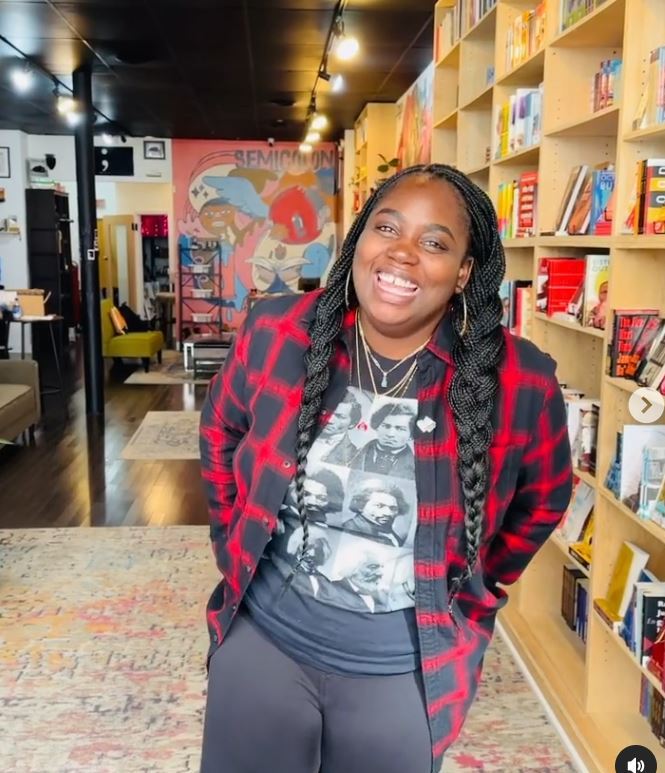 |
|
| Danielle Mullen | |
Mullen said she made the decision after a long-delayed effort to buy the Halsted St. building. The Fifth City Commons option was to have been a second location for the store, but now she will make it Semicolon's headquarters.
The space will also include a bar and restaurant, to be run by Mullen and her wife, Kimberly Moore, who also co-own 1308 Restaurant near Goose Island. Block Club Chicago noted that the vibe will be similar to the Busboys and Poets chain in the Washington, D.C., area, and will offer "book and wine flights" along with cocktails and a full food menu.
"We're going to create meals and drinks that go along with the books themselves, and I'm super excited about that," Mullen said. "Beyond that, Garfield Park has a very strong community image, and we are excited to start an internship with Marshall High School where we could bring interns in to not only learn about bookselling, but also learn about restaurants and restaurant management."
In 2021, the store moved from its original location at 515 N. Halsted to a larger space on Division Street in Wicker Park, but while sales were solid, the rent was higher and there was less of a community feel than in River West, Mullen told Block Club Chicago. In 2022, she moved Semicolon back to its original space with plans to buy the building, but the process became drawn out and ultimately stalled. Last summer, she converted her business to a nonprofit model to be eligible for grants and other funding to support Semicolon's literacy efforts.
"Our community service work is still happening. That can't stop," she said. "So we're still doing school visits. We're still giving books away to students while we're closed, so we're making sure that our community work comes first."
During Semicolon's final days in business at its Halsted store last weekend, there was an outpouring of support from longtime customers and neighbors. "That is why I'm so intentional about our community," Mullen said. "We have built this from the ground up, and we have people who just love other people who support us.... I want our customers to know that I am beyond grateful for them and the work that they do is what keeps me working. And so I'm excited for this next part that will come this summer."
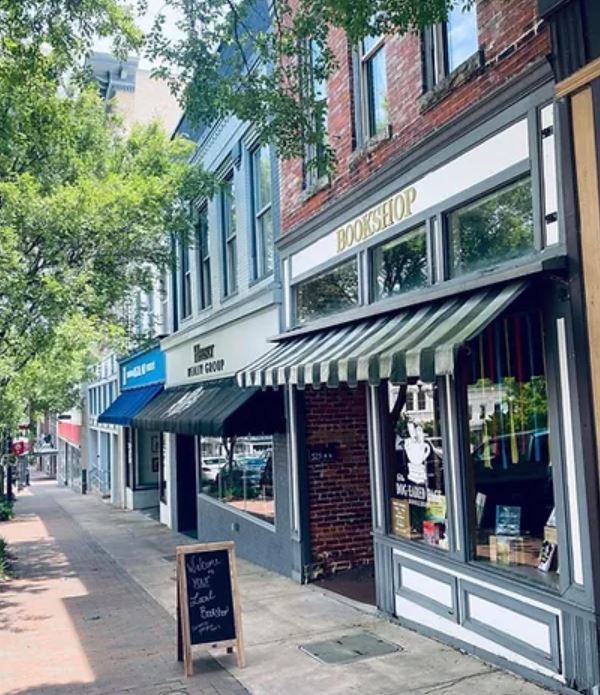
Work began on the changes upstairs last week. "We're doing some deep cleaning and will be doing some painting," bookshop owner Catherine Carter said. "The hope is to open in March. We're working on getting it ready to go now."
The new tea shop will serve a variety of tea lattes, including chai, caramel royal English breakfast, vanilla chamomile, and others. There will be 10 signature lattes, Carter noted, adding that charcuterie boxes with meats, cheeses, crackers, and fruits will also be offered.
The tea house will be accessed by a set of stairs located next to the bookstore's entrance. The upstairs space will be about half the size of the Dog-Eared Page Bookshop's open area. "Seating will be fairly limited," Carter said. "It's very cozy up there with a few tables and chairs."
The tea house will feature the same logo, a Basset hound named Fitzgerald, as the bookshop. Carter noted that she wants the tea house to complement her bookshop, but not encroach on other businesses in the area. She hopes to achieve a dark academia interior style in her tea house, with dark-blue walls and gold themes: "It's going to have a moody vibe. I'm excited about it."
 Publishers Lunch and the American Booksellers Association are hosting a virtual Buzz Books Editors and Authors Panel at 7 p.m. Eastern on Wednesday, January 24.
Publishers Lunch and the American Booksellers Association are hosting a virtual Buzz Books Editors and Authors Panel at 7 p.m. Eastern on Wednesday, January 24.
Authors Terah Shelton Harris (Long After We Are Gone), Lily Samson (The Switch), Isabel Banta (Honey), Essie Chambers (Swift River), and Alejandro Puyana (Freedom Is a Feast) will discuss their upcoming books with their respective editors. Editor Leigh Haber will once again serve as host/emcee.
Registration is free, and the first 25 booksellers to register will receive galleys of the featured books.
Independent booksellers in the U.K. reported "measured sales overall" for the 2023 holiday period, according to the Bookseller, which noted that the majority (36%) of respondents to its annual trading survey said sales were average in 2023 compared to the previous year, while 33% reported very good sales. Just 11% said sales had been excellent, while 19% called sales disappointing.
The results were similar to last year's numbers, "representing healthy trading overall for the 2023 festive season," the Bookseller wrote. Half of booksellers responding said foot traffic remained steady in 2023, compared to 2022, while 36% described business as down this year and only 14% reported higher foot traffic.
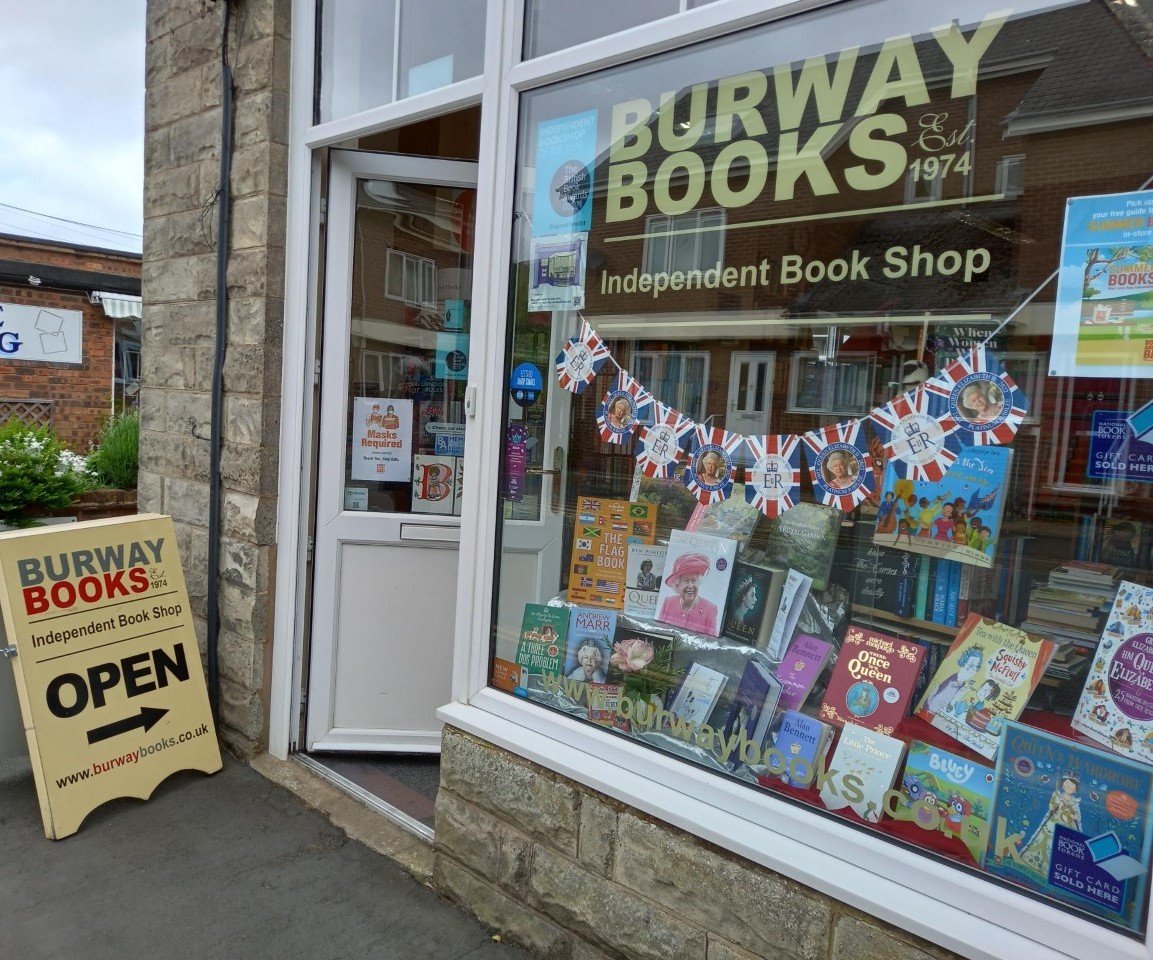 Supply and availability of titles was an issue for 39% of indie booksellers this year, according to the survey, but most booksellers said that this was quickly resolved and that there was "good availability" overall this year. Cost of living pressures continued to affect customer spending habits, with booksellers reporting fewer greetings card sales this year and that customers are "now more likely to buy paperbacks."
Supply and availability of titles was an issue for 39% of indie booksellers this year, according to the survey, but most booksellers said that this was quickly resolved and that there was "good availability" overall this year. Cost of living pressures continued to affect customer spending habits, with booksellers reporting fewer greetings card sales this year and that customers are "now more likely to buy paperbacks."
Rosalind Ephraim, the owner of Burway Books in Church Stretton, Shropshire, said that "stocking filler budget has not increased from last year and more customers [were] sticking to their budgets," adding that people "are more cautious" with spending, though "they are mostly aware that books are great value for money."
Looking ahead to 2024, 58% of indie booksellers reported they are hoping to grow and invest in their online businesses, and aim to use Bookshop.org and Libro.fm to boost their sales, as well as focusing more on promoting their bookshop on social media.
Mel Griffin, owner of Griffin Books, Penarth, Wales, said, "customers are continuing to turn back to the local high street as an alternative to bigger shopping centers, and we continue to reinvent ourselves, building our events program and schools work and aiming to give every customer an enjoyable and efficient experience of shopping with us".
---
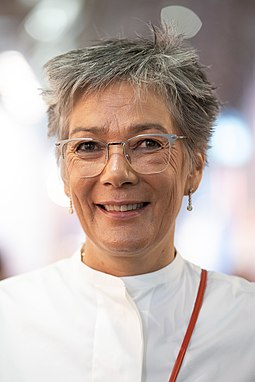 |
|
| Karin Schmidt-Friderichs | |
Branchen-Monitor BUCH, a monthly report documenting the development of the German book market, reported that the country's bricks-and-mortar bookshops ended 2023 with a 2.8% increase in sales and a 2.2% decrease in units sold compared to 2022, with the positive turnover due to prices paid for books rising by an average of 4.9%, the European & International Booksellers Federation's Newsflash reported.
"We are living in challenging times. The book industry is also feeling the effects. Compared to a weak previous year, the book trade has recovered in terms of turnover. Particularly during these difficult times, people are using books to expand their knowledge, to switch off, but also to deal with the current reality--a good sign in view of major political and social issues and conflicts," said Karin Schmidt-Friderichs, chair of the Börsenverein des Deutschen Buchhandels (the German book industry association), who also stressed the need for structural support of the trade in this tense economic situation.
---
BookNet Canada's blog featured the bestselling books in three categories (fiction, nonfiction, juvenile/YA) by Canadian authors last year. The results were based on print sales volume in Canada from January 1 to December 3, according to SalesData, BookNet’s national sales tracking service for the Canadian English-language trade book market. The top 10 fiction titles were:
Peter 'Kim' Flottum, beekeeping expert and bestselling author, died December 10. He was 76. Flottum had a rich background and expertise in plant science, honeybee research, and basic farming, dedicating over 30 years as the editor of Bee Culture magazine. His publisher, Quarto, noted that Flottum's "impact extended far beyond the pages of the magazine, as he authored multiple bestselling books that have become indispensable resources for beekeeping enthusiasts."
Notable among these are First-Time Beekeeping, In Business with Bees, Common Sense Natural Beekeeping, and The Backyard Beekeeper, 5th Edition, which is scheduled for publication next month by Quarry Books.
Winnie Danenbarger, senior v-p and group publishing director of the Quarto Group, said that "in celebrating Kim's life, we honor his invaluable contributions to beekeeping and the indelible mark he left on the hearts and minds of those fortunate enough to learn from him. His passion, knowledge, and dedication will continue to inspire beekeepers and nature enthusiasts for generations to come."
Quarto also noted that Flottum's "commitment to education was unwavering, teaching beginning and advanced beekeeping courses, crisscrossing the country to enlighten audiences. His extensive travels and frequent contributions to publications covered a spectrum of topics, ranging from the fundamentals of honeybees and beekeeping biology to the intricate dynamics of the business of bees, pollination, varietal honey production, and more."
A pioneer in advocating for honeybee safety, Flottum championed the cause of ensuring optimal honeybee health, promoting abundant forage, and advocating for the judicious use of agricultural pesticides. His legacy lives on as beekeeping's foremost proponent of these fundamental principles.
He earned his bachelor's degree in horticulture from the University of Wisconsin before contributing significantly to research at the USDA Honey Bee Research Lab in Madison. His expertise encompassed crop pollination, addressing pesticide challenges for honeybees, and identifying "honey plants" for home landscapes. He served as president of the Connecticut Beekeepers' Association and continued tending to his bees in the backyard of his Medina, Ohio, home until his death.
 At what is likely to be the first annual Women CEO Dinner, reportedly a fun, bookish event, held in New York City this week: (from l.) Ellen Adler, publisher of The New Press; Dominique Raccah, publisher, Sourcebooks; Shimul Tolia, CEO, Little Bee Books; Jenn Risko, publisher and co-founder, Shelf Awareness; Bronwen Hruska, publisher, Soho Press; Kirsty Melville, president and publisher, Andrews McMeel Universal; Mary McAveney, president and CEO, Abrams Books.
At what is likely to be the first annual Women CEO Dinner, reportedly a fun, bookish event, held in New York City this week: (from l.) Ellen Adler, publisher of The New Press; Dominique Raccah, publisher, Sourcebooks; Shimul Tolia, CEO, Little Bee Books; Jenn Risko, publisher and co-founder, Shelf Awareness; Bronwen Hruska, publisher, Soho Press; Kirsty Melville, president and publisher, Andrews McMeel Universal; Mary McAveney, president and CEO, Abrams Books.
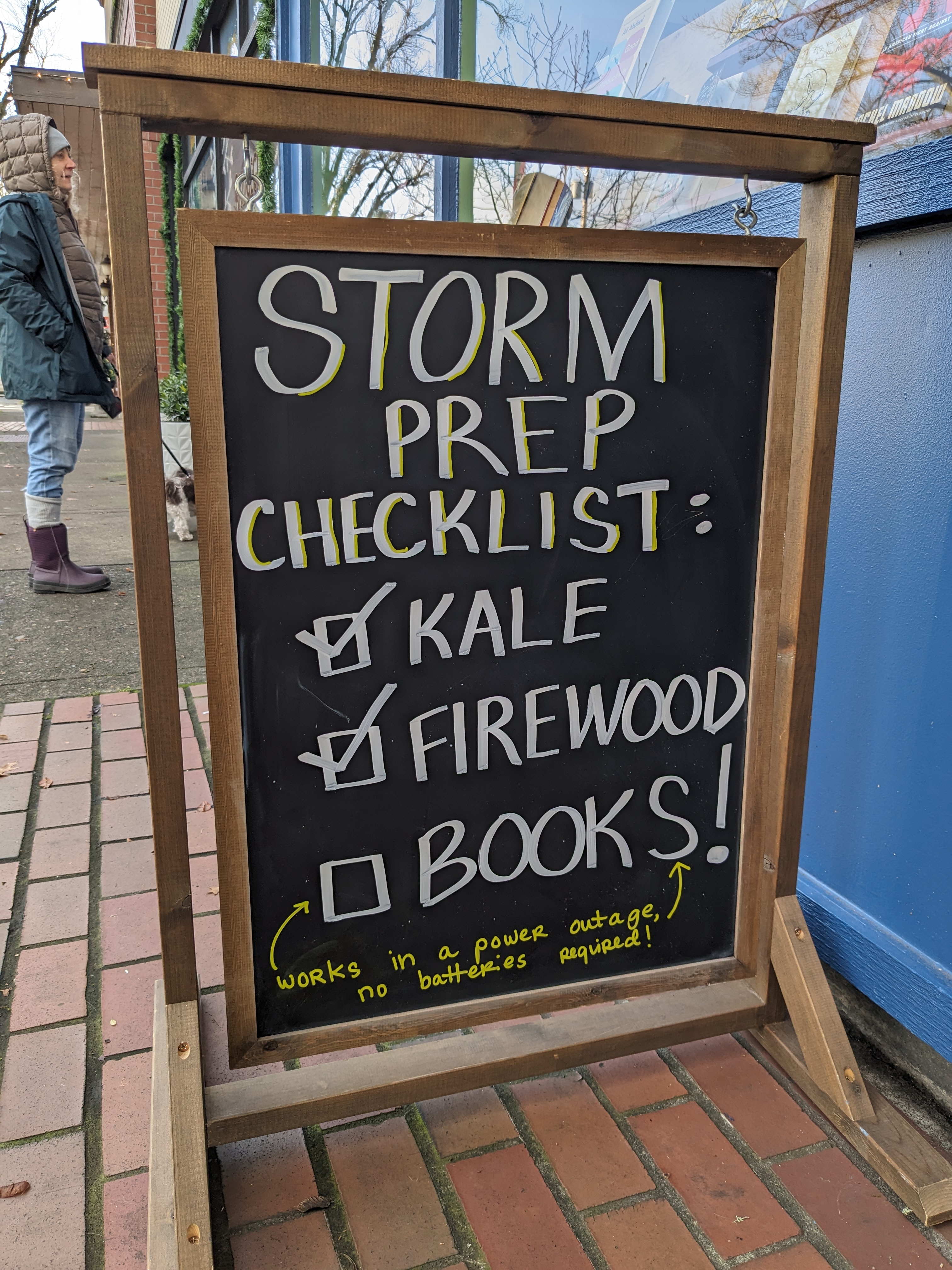 The folks at Spoke & Word Books in Milwaukie, Ore., had some prep suggestions for this coming weekend's rare snowstorm.
The folks at Spoke & Word Books in Milwaukie, Ore., had some prep suggestions for this coming weekend's rare snowstorm.
 It's inventory season for many bookstores, but at Horton's Books & Gifts, Carrollton, Ga., bookseller cat Dante has come up with a pretty good excuse to stay on the sidelines: "I would help with inventory, but I don't have thumbs!"
It's inventory season for many bookstores, but at Horton's Books & Gifts, Carrollton, Ga., bookseller cat Dante has come up with a pretty good excuse to stay on the sidelines: "I would help with inventory, but I don't have thumbs!"
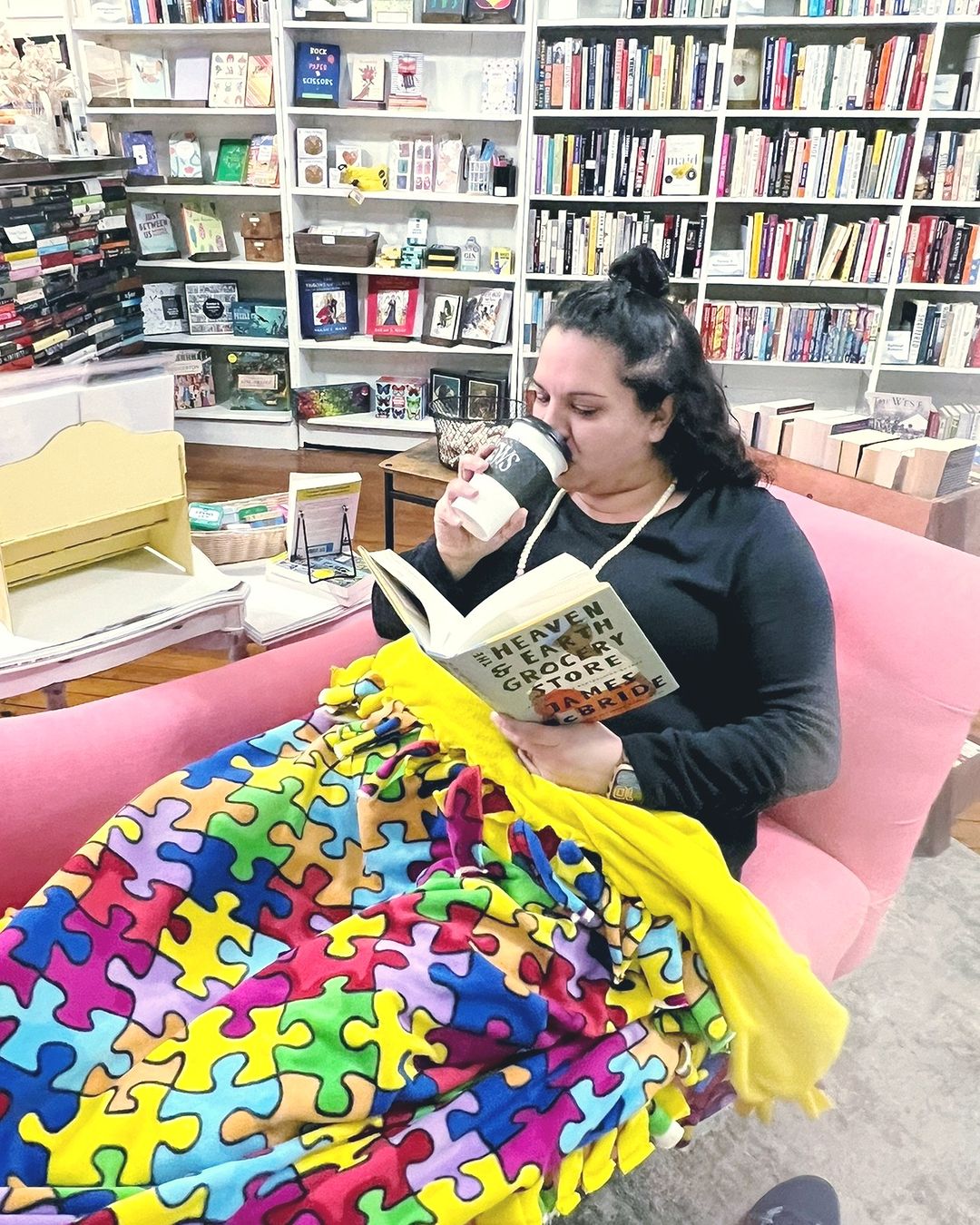 "Come find a good read to snuggle up with this evening!" First Chapter Bookshop, Seneca, S.C., posted on Instagram.
"Come find a good read to snuggle up with this evening!" First Chapter Bookshop, Seneca, S.C., posted on Instagram.
Sami Thomason-Fyke has joined Como Sales as a rep covering the Southeast.
---
Maggie Salko has been promoted to marketing & publicity associate from marketing coordinator at Little Bee Books.
Today:
NPR's Science Friday: Adam Frank, author of The Little Book of Aliens (Harper, $27.99, 9780063279735).
Nuremberg, a film adaptation of Jack El-Hai's 2013 book, The Nazi and the Psychiatrist: Hermann Göring, Dr. Douglas M. Kelley, and a Fatal Meeting of Minds at the End of WWII (PublicAffairs), will begin filming in Hungary next month. The project is directed by James Vanderbilt (Zodiac, Truth), who also wrote the screenplay.
The cast includes Russell Crowe as Göring, Rami Malek as Kelley, and Michael Shannon as Supreme Court Justice Robert H. Jackson, the chief prosecutor of the first Nuremberg trial.
Bluestone Entertainment (Slingshot), Walden Media (Ray, Everest), and Szèchenyi Funds acquired the rights to El-Hai's book and Vanderbilt's script. Richard Saperstein, William Sherak, Vanderbilt, Brad Fischer, Istvan Major, and Paul Neinstein are producing, along with Filmsquad. El-Hai is an executive producer.
The Mystery Writers of America has announced the recipients of its Grand Master and Ellery Queen awards, which will be presented at the 78th Annual Edgar Awards Ceremony, scheduled to be held May 1.
The board chose Katherine Hall Page and R.L. Stine as the 2024 Grand Masters, an award that acknowledges important contributions to the genre as well as for a body of work that is both significant and of consistent high quality. Michaela Hamilton of Kensington Publishing will receive the Ellery Queen Award, which honors outstanding writing teams and outstanding people in the mystery-publishing industry.
MWA executive v-p Donna Andrews said that the two Grand Masters "have given so much to our genre--not just through their writing, but also through their generosity to other writers, their hard-working professionalism, and their boundless enthusiasm for the written word."
Ellery Queen Award winner Michaela Hamilton is executive editor at Kensington and editor in chief of Citadel. MWA said, "Her importance in the discovery of new writers and emphasis on publishing traditional mysteries, thrillers, and suspense novels cannot be underestimated."
Andrews added: "Michaela Hamilton has worked with dozens of new and seasoned writers over the decades, not only making Kensington a powerhouse in the mystery and thriller field, but also giving genre lovers hundreds of books--and thousands of hours of reading pleasure."
 |
|
| (photo: Erol Ahmed) | |
İnci Atrek is the author of Holiday Country (Flatiron, January 9, 2024), a coming-of-age novel that is equal parts escapist and seductive, and set in a Turkish seaside retreat. She holds a BA in English and Creative Writing from Wellesley College.
Handsell readers your book in 25 words or less:
Intergenerational love triangle along the Turkish seaside, and an exploration of cultural identity, language, and mother-daughter dynamics.
On your nightstand now:
The Age of Innocence by Edith Wharton, I Could Live Here Forever by Hanna Halperin, Bright Dead Things by Ada Limón.
Favorite book when you were a child:
I was obsessed with Brian Jacques's Redwall series. Looking back, so much of what I read as a kid were science fiction and fantasy, two genres I haven't touched in years. Maybe it's time to revisit them?
Your top five authors:
An impossible answer, but here's an attempt that's both in no particular order and in a constant state of flux: Elif Batuman, Deborah Levy, David Szalay, Vladimir Nabokov, and Maggie Nelson.
Book you've faked reading:
There were definitely a few books I technically "read" without understanding anything at all. In high school, I decided to speed-read 30 or so pages of Joseph Conrad's Heart of Darkness over lunch right before that afternoon's quiz. I'm a fast reader, and the section seemed short enough that finishing and understanding it was within the realm of possibility. The quiz was, of course, a catastrophe, but for some odd reason I didn't learn my lesson and continued saving each week's reading for the lunch before the quiz. This never happened with any other required reading--only Heart of Darkness. I guess I had this ridiculous idea that a short book should be easily conquerable, and I stubbornly kept trying to prove it. I have yet to return to that novella with the time and attention it deserves.
 Book you're an evangelist for:
Book you're an evangelist for:
For women in their mid-to-late 30s who are waffling on whether or not they want children, I always recommend Sheila Heti's Motherhood. Not because it helps clear up any confusion, but because it makes the grueling ambivalence even worse, leading to rich conversations that I eagerly look forward to.
Book you've bought for the cover:
David Szalay's All That Man Is. I'll buy any book that has a single person against the backdrop of a vast ocean on the cover. Thankfully, I ended up loving it.
Book you hid from your parents:
None, but as an adult I continue to hide all my self-help books whenever my parents visit.
Book that changed your life:
Vladimir Nabokov's Lolita, which I read for the first time in class. It opened my eyes to how rewarding and complex the reading experience can be, as well as to the deeply manipulative and seductive power of language.
Favorite line from a book:
I love the ending of "Seven Years of Trips" in Olga Tokarczuk's Flights. It's a short passage about what it means to travel and what, exactly, we're left with once the trip is over and we've returned home: " 'The things I've seen are mine now,' the young man, suddenly revived, concluded, slapping his palm down on his thigh."
Five books you'll never part with:
I've lived in six countries and even more cities, so I've been forced to part with many books that I swore I'd never leave behind. Most of my favorites, I've had to buy over and over. But here are five that have remained with me, in their original form:
Brian Boyd's two Nabokov biographies, The Russian Years and The American Years. I requested these as a holiday present from my family a few years ago, and my father found and gifted me the first editions.
Rainer Maria Rilke's Letters to a Young Poet, gifted to me in college by a friend and fellow English major. Receiving that book was the first time I felt seen as a writer.
John Freely's A Bridge of Culture: Robert College--Boğaziçi University: How an American College in Istanbul Became a Turkish University. Like the Nabokov biographies, this is a pretty substantial book to schlep between countries, but I refuse to let it go. It's a detailed history of one of Turkey's most well-known universities that centers on my three favorite topics: Istanbul, Americans in Turkey, and academia.
Louise Glück's Averno, which has too much marginalia from my college days for me to ever part with.
Book you most want to read again for the first time:
Annie Ernaux's Simple Passion--the book in my library with the most sentences underlined.
The Exvangelicals: Loving, Living, and Leaving the White Evangelical Church by Sarah McCammon (St. Martin's Press, $30 hardcover, 320p., 9781250284471, March 19, 2024)
 NPR reporter Sarah McCammon's insightful first book, The Exvangelicals, delves into the past and present of the white American evangelical Christian movement, exploring why younger evangelicals are leaving the church in droves. McCammon, who grew up evangelical in Kansas City, Mo., charts the movement's history, its massive cultural impact, its problematic association with the Republican Party, and some of the ways its younger members are finding spiritual fulfillment elsewhere.
NPR reporter Sarah McCammon's insightful first book, The Exvangelicals, delves into the past and present of the white American evangelical Christian movement, exploring why younger evangelicals are leaving the church in droves. McCammon, who grew up evangelical in Kansas City, Mo., charts the movement's history, its massive cultural impact, its problematic association with the Republican Party, and some of the ways its younger members are finding spiritual fulfillment elsewhere.
McCammon begins with a personal story: her longtime fear that her grandfather, Harvard-educated but not particularly religious, would go to hell because of his lack of faith (and his sexual orientation). She thoughtfully recounts the potent mix of fear and love that shaped the evangelical culture of her youth: the image of God as a stern but loving father, and the contradictions of a church that emphasized salvation by grace, yet imposed many rules on its members (especially women and girls).
Through extensive interviews with religious scholars, cultural critics, and fellow former evangelicals, McCammon traces the movement's rise through the second half of the 20th century and its eventual alliance with the Republican Party. She highlights some key issues that melded politics and religion for many evangelicals, most notably abortion and LGBTQ+ rights, and explores how evangelical leaders such as Dr. James Dobson influenced millions of Americans to vote, behave, and worship a certain way. She paints a vivid picture of the evangelical subculture of the 1980s and 1990s, including the damaging messages of purity culture, demonstrations outside family planning clinics, and the eventual embrace of Tea Party political rhetoric and "alternative facts." She pulls no punches about the movement's unholy alliance with Donald Trump, an alliance McCammon witnessed firsthand as she reported on religion and politics during Trump's campaigning. Her narrative is thoughtful and well-researched: a fascinating blend of memoir, reportage, and commentary.
Though McCammon exposes evangelicalism's weaknesses, she doesn't demonize either the movement or its members: having grown up evangelical, she knows that real community and strong bonds can both support church members and make it harder for them to leave. She details some of the challenges in her relationship with her parents, resulting from McCammon's intellectual and spiritual growth, which took her outside the walls of the evangelical church. She also interviews other "exvangelicals" who have left behind the movement's faulty theology, but miss their former communities, and are trying to help others wrestling with similar questions.
Incisive, clear, and deeply compassionate, The Exvangelicals is a brilliant critique of a powerful cultural movement, and a moving meditation on loving (and eventually leaving) one's roots. --Katie Noah Gibson, blogger at Cakes, Tea and Dreams
Shelf Talker: NPR reporter Sarah McCammon's incisive memoir explores the cultural impact of the American evangelical movement alongside her own complicated story of growing up evangelical.
"How many books did you read in 2023? Are you in the top 1%?" This question was posed in a headline for Andrew Van Dam's Washington Post piece last Friday. He was exploring a recent Economist/YouGov poll about America's reading habits, which found that of 1,500 Americans surveyed, "a less-than-ideal 46% finished zero books last year and 5% read just one. So, if you read more than two books in 2023, congratulations! You're in the top half of U.S. adults."
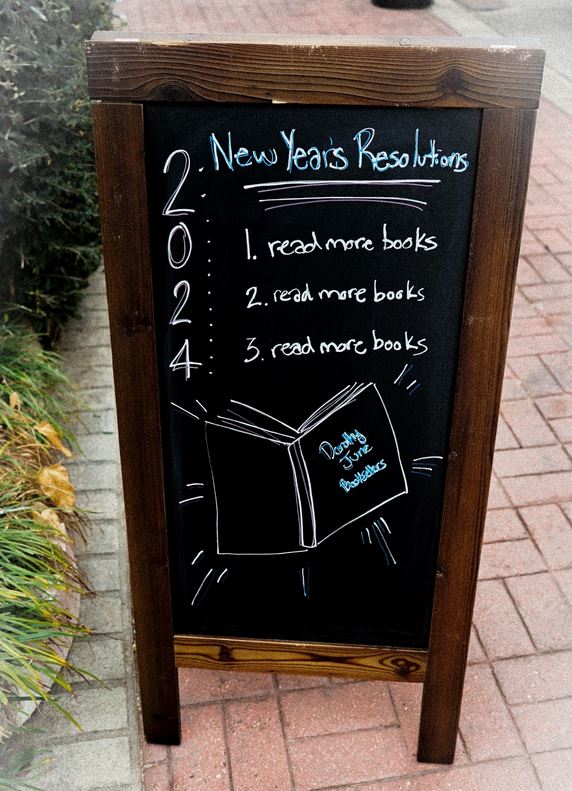 |
|
| At Dorothy June Booksellers, Foley, Ala. | |
Having just recently considered my own ambivalence toward New Year's reading goals and resolutions, I was perhaps more than a little susceptible to a reading habits data blitz. Maybe some guilt was involved, too.
I like to think that I'm only in competition with myself as a reader, but it's not really that simple. I read for pleasure, but I also read professionally. There's a numbers game always lurking in there somewhere, whether I like it or not.
I did feel marginally better about my 2023 performance when Van Dam noted that "reading five books put you in the top 33%, while reading 10 books put you in the top 21%. Those of us who read more than 50 books are the true one-percenters: people who read more books than 99% of their fellow Americans."
As tends to be the case with surveys on any topic, I do not qualify as a one-percenter, but YouGov senior data journalist David Montgomery did observe: "While reading 20, 30, or 40 books per year probably won't earn you a free personal pan pizza, it does put you in rare company--among the top 10% to 15% of readers" who finished at least 29 books in 2023.
That made me feel a little better. I might have even cracked the top 10%, though given my profession that still seems like underachieving.
Natalie Stechyson of CBC News posed a different question this week: "Since when did reading books become a game?" She wrote: "Read your height. Read the world. Read the alphabet. Read anything, but read a lot of it. Read less, but read more critically. Read only library books. Listen to only audio books. Read only books with cats as the main characters (no, really, that's a real challenge that exists).... As another new year begins, the options for joining challenges that promote reading seem endless, and they have become a popular way to encourage people to consume more books."
Consume is an interesting word choice.
There are alternatives. "It's either sport, or it's homework. I try to make it neither," Jael Richardson, executive director of The FOLD Canada, a foundation that celebrates diverse authors and storytellers at literary festivals and events based in Brampton, Ont., told CBC News.
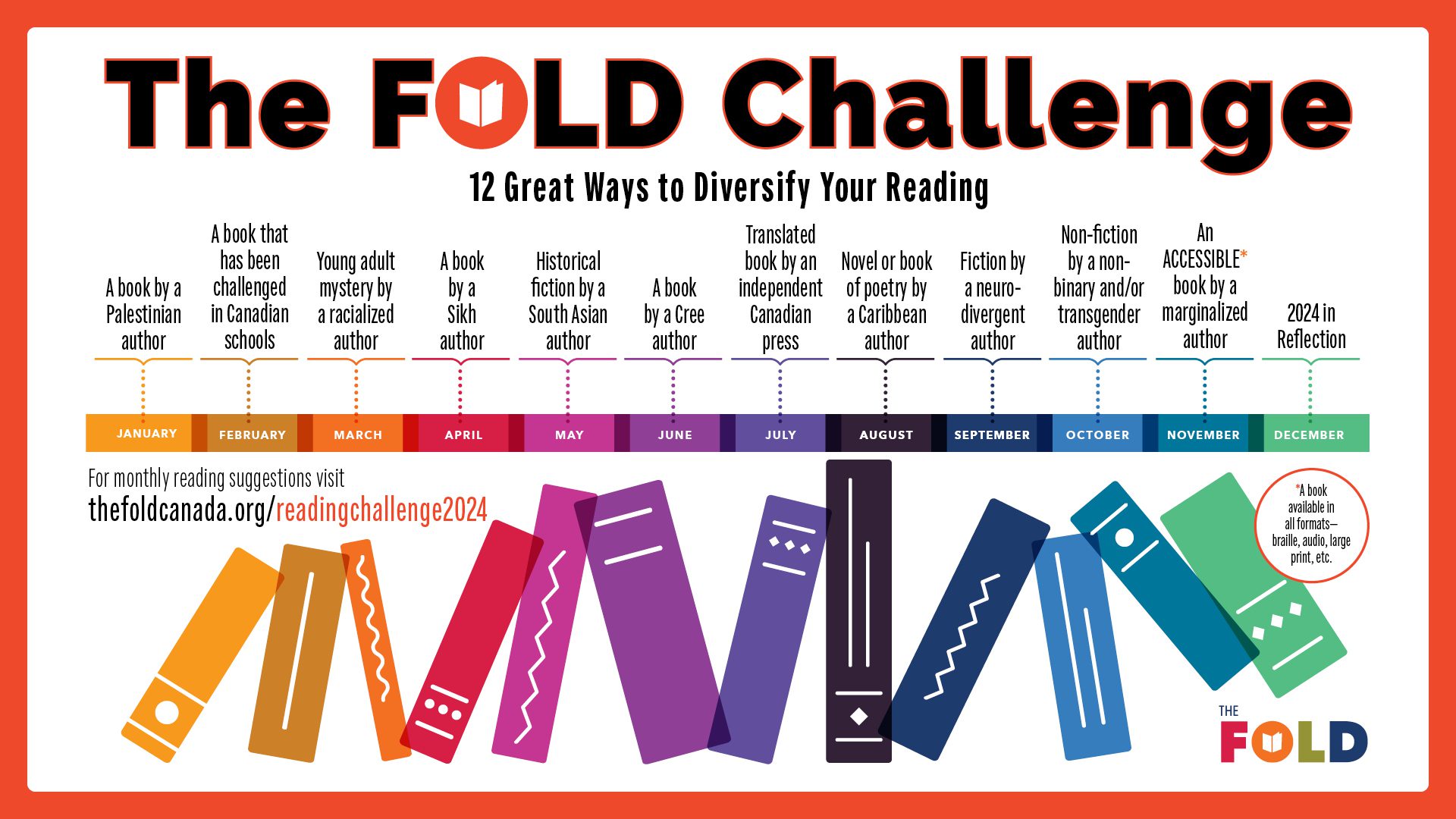 Each year, the Festival of Literary Diversity releases a 12-book challenge, "encouraging readers to diversify their selections rather than trying to meet a specific number of titles," Stechyson noted. January's challenge is to read a book by a Palestinian author; February's is to read a book that's been challenged in Canadian schools.
Each year, the Festival of Literary Diversity releases a 12-book challenge, "encouraging readers to diversify their selections rather than trying to meet a specific number of titles," Stechyson noted. January's challenge is to read a book by a Palestinian author; February's is to read a book that's been challenged in Canadian schools.
While many personal reading goals focus on the numbers, the FOLD program "aims to create more conscious readers while also amplifying voices that don't get as much publicity," according to Richardson, who added: "Reading is a really, really important act that's unique from all other kinds of media in that you consume it on your own. As a result, when it comes to difficult topics and difficult subject matter, it's a really powerful place to create change in your own heart, in your own mind, and to cultivate empathy."
There is also, of course, the business side of reading challenges and goals to consider. I don't underestimate that, and am grateful for the sales boost such programs can give. They're good for the book trade, which has its own challenges and goals for 2024. I may be contradicting myself here with my reticence about playing the numbers game as a reader while simultaneously enjoying the game from a business standpoint, but those are the cards I was dealt a long time ago.
In the CBC News piece, Carly Watters, a literary agent and co-host of the podcast The Sh*t No One Tells You About Writing, noted that social media reading challenges encourage people to share what they're reading, which helps authors with brand awareness, book sales, discoverability, library holds, audiobook sales and increased demand across the board. "This helps create habits in readers which will help keep them life-long readers which also means life-long book consumers, which keeps our business and industry healthy," she noted.
Despite underachieving in terms of the total number of books I read last year, I grudgingly admire readers who enthusiastically take on challenges and set high goals for themselves.
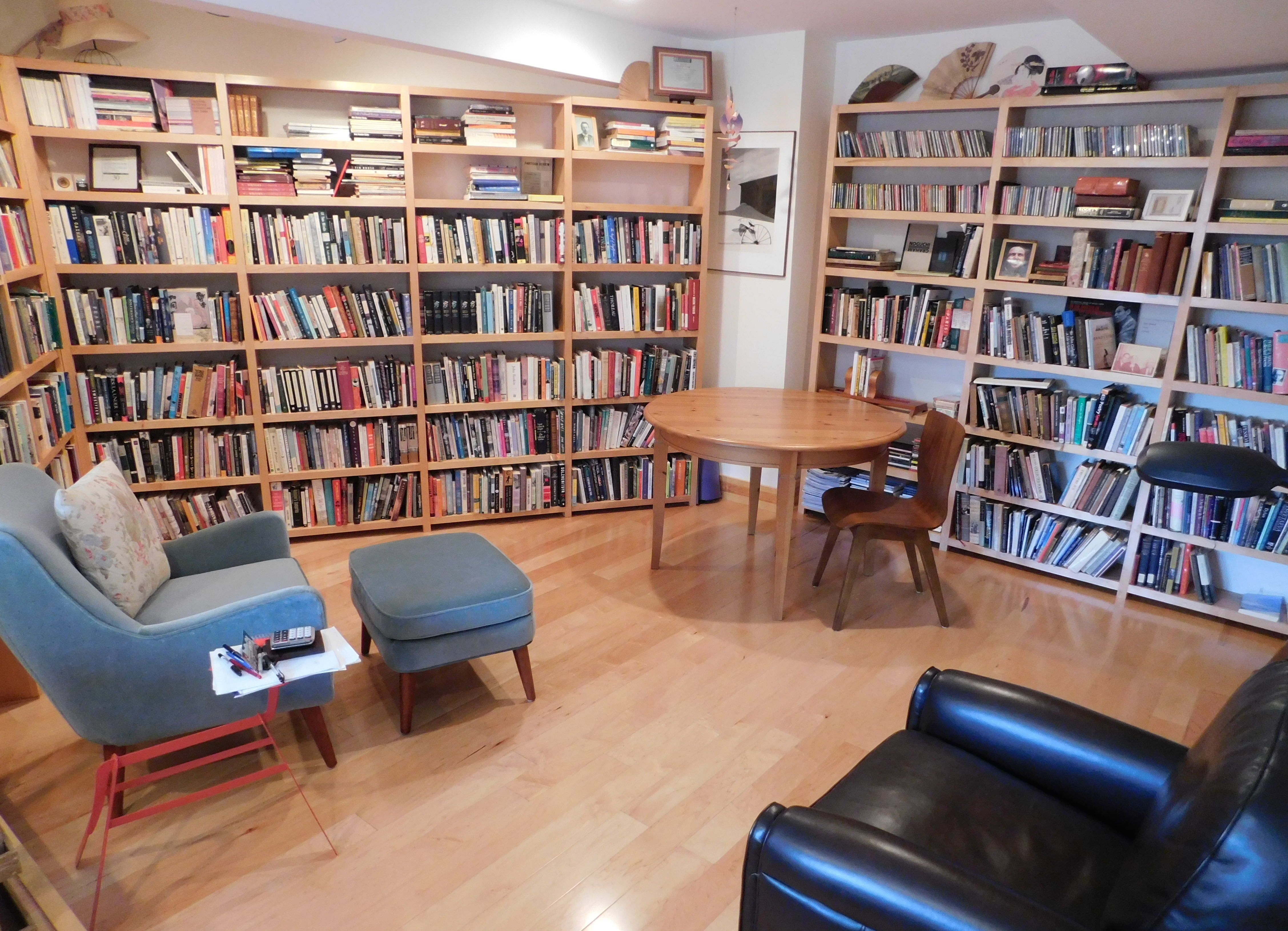
Talk about setting goals for a new year. If I'm in the top 3% in terms of book ownership, maybe I really should try to pick up the reading pace. Just call it my 2024 "Have You Actually Read All These Books?" guilt challenge.